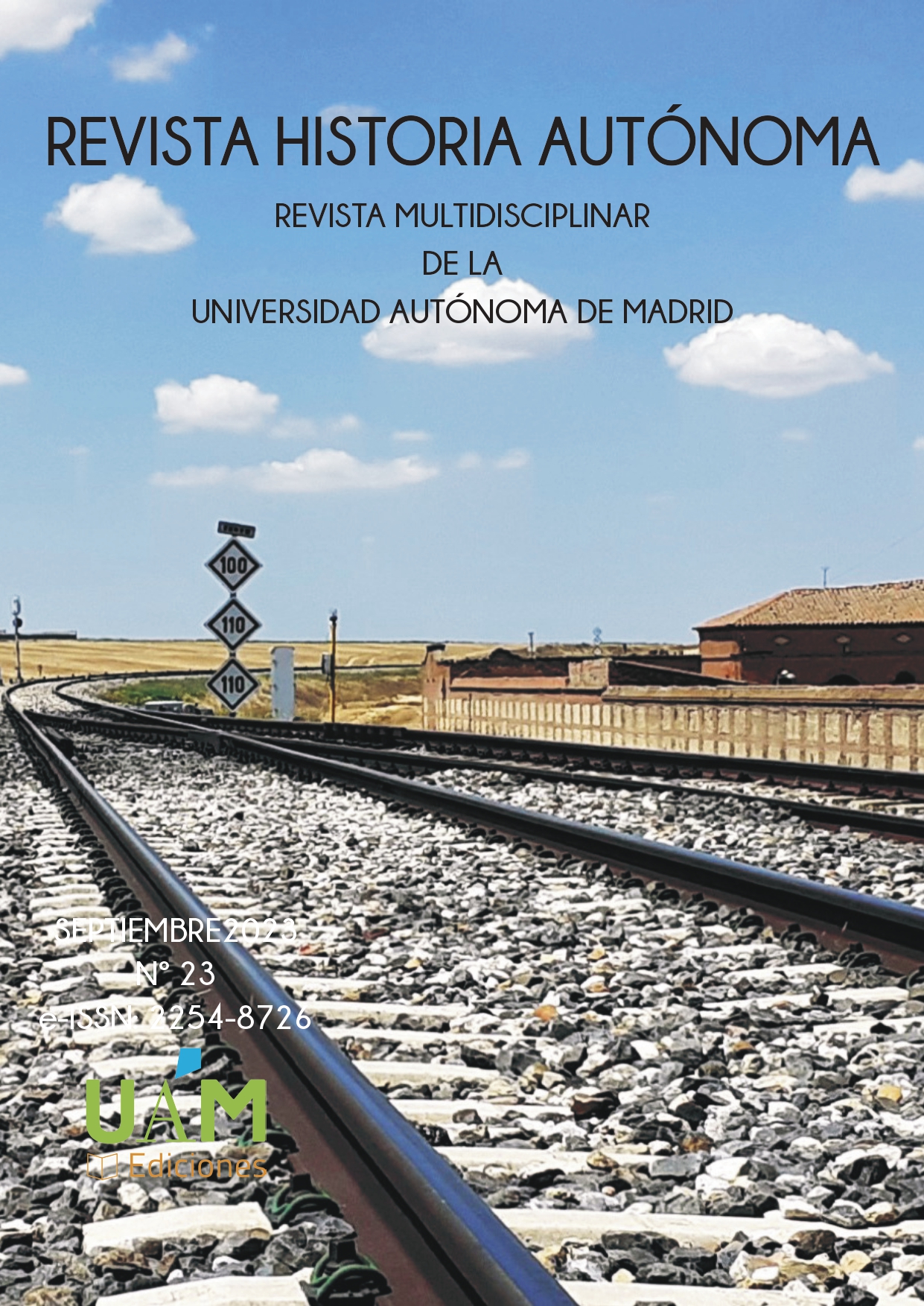La influencia del pensamiento de Patrice Lumumba en la internacionalización de la crisis de Katanga
Palabras clave:
República Democrática Del Congo, Patrice Lumumba; pensamiento; Katanga, Katanga, crisis, Patrice Lumumba, pensamientoDerechos de autor 2023 Ana Olmedo Alberca

Esta obra está bajo una licencia internacional Creative Commons Atribución-NoComercial 4.0.
Resumen
El objetivo del presente artículo es analizar el impacto del pensamiento de Patrice Lumumba en el transcurso y la internacionalización de la crisis causada por la secesión de la provincia de Katanga (República Democrática del Congo) entre 1960 y 1963. La figura del que sería el primer ministro de la recién constituida República Democrática del Congo, antiguo Congo belga, experimenta una evolución de pensamiento desde de la connivencia con la presencia belga hasta el rechazo de la intromisión occidental. Es precisamente este viraje el que le pone en el punto de mira de comunidad internacional, la cual, en el contexto histórico caracterizado por el inicio de las descolonizaciones y la Guerra Fría, interpreta sus movimientos como un acercamiento al bloque comunista, suscitando la intervención de actores internos y externos al continente africano.
Partiendo del análisis de su pensamiento a través de sus principales discursos, se realizará una breve contextualización histórica para pasar a abordar la transformación del mismo, los tres pilares que lo conforman (anticolonialismo, panafricanismo y centralismo) y los factores endógenos y exógenos que frustraron su proyecto político, y que hacen de esta crisis uno de los ejemplos más paradigmáticos de neocolonialismo.
Descargas
Citas
Aksu, Esref, The United Nations, Intra-State Peacekeeping and Normative Change, Manchester, Manchester University Press, 2003.
Asante, Charles, ‘‘Ghana and the United Nations 1960s mission in the Congo: a Pan-African explanation’’, en Third World Quaterly, 41 (2019).
Blackpast.org, ‘‘(1960) Patrice Lumumba’s last letter to Pauline Lumumba’’. « https://www.blackpast.org/global-african-history/primary-documents-global-african-history/patrice-lumumbas-letter-pauline-lumumba-1960/» [consultado el 28 de julio de 2022].
Casa África, ‘‘Joseph Kasavubu’’. «https://www.casafrica.es/pt/pessoa/joseph-kasavubu» [consultado el 24 de abril de 2022].
Consejo de Seguridad de Naciones Unidas, Comunicado del Presidente Kasavubu y del Primer Ministro Lumumba, 12 de junio 1960. https://digitallibrary.un.org/record/744498/files/A_PV-917-ES.pdf [consultado el 24 de abril de 2022].
Cooper, Frederick, Africa in the World: Capitalism, Empire, Nation-State, Massachusetts, Hardvard University Press, 2014.
De Beniparrell, Carlos, ‘‘El fin de la secesión de Katanga’’ en Revista de Política Internacional, 66 (1963).
Deviegler, Clara, ‘‘Beyond ‘hidden resistance’ against colonial boundaries: Bundu dia Kongo and their philosophy of colonial boundaries in Bas-Congo region of the Democratic Republicof Congo’’, en Africa Borderland Research Network. « https://www.aborne.net/s/Devlieger.pdf» [Consultado el 23 de julio de 2022].
De Witte, Ludo, The assasination of Patrice Lumumba, Londres/Nueva York, Verso Books, 2002.
Doty, Roxanne Lynn, ‘‘Foreign Policy as Social Construction: A Post-Positivist Analysis of U.S. Counterinsurgency Policy in the Philippines’’, en International Studies Quarterly, 37 (1993).
Fanon, Frantz, Piel negra, máscaras blancas, Madrid, Akal, 2009.
Gerard, Emmanuel y Kuklick, Bruce, Death in the Congo. Murdering Patrice Lumumba, Massachusetts, Hardvard University Press, 2015.
Gonze, Collin, ‘‘Katanga Secession: The New Colonialism’’, en Africa Today, 1 (1962). «https://www.jstor.org/stable/4184284» [consultado el 10 de abril de 2022].
International Crisis Group, ‘‘Katanga: The Congo’s Forgotten Crisis’’, Africa report , 103 (2006). «https://reliefweb.int/sites/reliefweb.int/files/resources/E710C7670C776BB7852570F10058BA72-icg-drc-9Jan.pdf» [Consultado el 22 de marzo de 2022].
Kadima-Tshimanga, Bajana, ‘‘La société sous le vocabulaire : Blancs, Noirs et Evolués dans l'ancien Congo belge (1955-1959)’’, en Mots, 5(1982).
Klein, Oliver y Licata, Laurent, ‘‘When group representations serve social change: The speeches of Patrice Lumumba during the Congolese decolonization’’, en British Journal of Social Psychology, 42 (2003. «https://doi.org/10.1348/014466603322595284» [consultado el 9 de abril de 2023].
Kent, John, ‘‘Lumumba and the 1960 Congo Crisis: Cold War and the Neo-Colonialism of Belgian Decolonization’’, en Bandeira Jerónimo, Miguel y Costa Pinto Ántonio (Eds.), The Ends of European Empires. Cases and Comparisons, Londres, Palgrave McMillan, 2015.
Larmer, Miles y Kennes, Erik, ‘‘Rethinking the Katangese Secession’’, en The Journal of Imperial and Commonwealth History, 42 (2014). «https://doi.org/10.1080/03086534.2014.894716» [consultado el 12 de abril de 2022].
Ngonzola-natalaja, Georges, Patrice Lumumba,, Ohio, Ohio University Press, 2014.
O’Malley, Alana, ‘‘Ghana, India, and the Transnational Dynamics of the Congo Crisis at the United Nations, 1960–1’’, en The International History Review, 37 (2015).
Organización de Naciones Unidas, ‘‘Character Sketches: Patrice Lumumba by Brian Urquhart’’. «https://news.un.org/en/spotlight/patrice-lumumba-brian-urquhart» [Consultado el 22 de marzo de 2022].
Patrice Lumumba, ‘‘Discurso del día de la independencia’’. «https://www.youtube.com/watch?v=Xh9c62PRwqo&t=236s&ab_channel=KMmedia». [Consultado el 23 de marzo de 2022].
Patrice Lumumba Interview: https://www.youtube.com/watch?v=jhrH6LUfhF8 [Consultado el 22 de marzo de 2022].
Renouvain, Pierre, Historia de las Relaciones Internacionales. Tomo 1, Madrid, Aguilera, 1960.
Sartre, Jean-Paul, ‘‘Introduction’’ en Van Lierde, Jean (ed.), Lumumba Speaks. The Speeches and Writings of Patrice Lumumba, 1958-1961, Boston-Toronto, Little, Brown and Company, 1972.
Senghor, Leopold Sedar, ‘‘Negritude’’, en Indian Literature, 17 (1974). «https://www.jstor.org/stable/23329885» [Consultado el 22 de abril de 2022].
Van Lierde, Jean, Lumumba Speaks. The Speeches and Writings of Patrice Lumumba, 1958-1961, Boston-Toronto, Little, Brown and Company, 1972.
